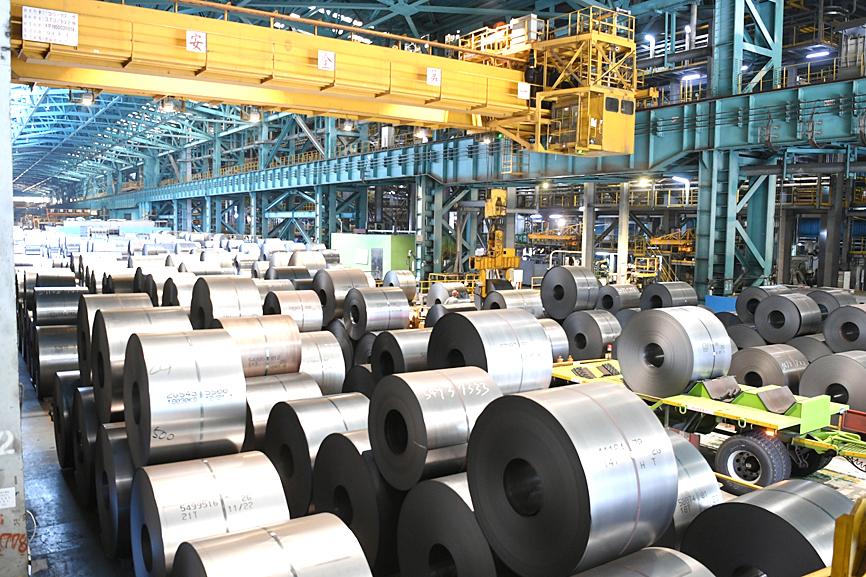China Steel Corp (CSC, 中鋼), the nation’s largest steelmaker, yesterday said it would lower domestic steel prices by 3.32 percent on average for delivery next month, as imports from China and Russia have been trading lower than market prices, depressing demand for local steel.
The price cut, the fourth monthly reduction in a row, also reflects weak demand from customers that are trying to deplete excessive inventories, the Kaohsiung-based company said in a statement.
The reduction is milder than the 5.61 percent cut for shipments this month, which CSC said points to more signs of a global recovery.

Photo courtesy of China Steel Corp
“The price cut aims to dispel market speculation [about a deeper downward revision] and better reflect market conditions,” CSC said. “The company expects a turnaround in September and is prepared for the traditional high season to arrive in the fourth quarter.”
With a weakening global economy and extreme weather events significantly curtailing demand for high-priced commodities — slowing steel inventory digestion — major steelmakers in the US, Europe and China are reducing output by suspending operations at some furnaces for maintenance, CSC said, adding that this would help mitigate a supply glut and bring forward the low point for steel prices.
Chinese steelmakers such as Baowu Steel Group Group Ltd (寶武鋼鐵) and Angang Steel Co (鞍山鋼鐵) are seeking a price rebound as Beijing is to inject 7.2 trillion yuan (US$1.06 trillion) into infrastructure construction projects to boost economic growth, CSC said.
Moreover, European steelmakers might raise prices to reflect rising electricity rates and energy costs, while US steelmaker Nucor Corp has hiked the price of thin steel sheets, it said.
The latest price trends “indicate that the global steel industry is seeing a price rebound from the dip,” it said.
The latest price adjustments would lower prices of hot-rolled steel plates and coils by NT$1,000 per tonne and cold-rolled coils by NT$1,200 per tonne, the company said.
Prices of galvanized steel coils used in anti-fingerprint sheets and those for construction would both fall NT$1,000 per tonne, the company said.
Prices of hot-dipped, zinc-galvanized steel coils used in construction and enameled steel, and those used in home appliances and computers would fall by NT$1,000 per tonne, while prices for electrical steel roll would drop by NT$1,200 per tonne, it added.

MULTIFACETED: A task force has analyzed possible scenarios and created responses to assist domestic industries in dealing with US tariffs, the economics minister said The Executive Yuan is tomorrow to announce countermeasures to US President Donald Trump’s planned reciprocal tariffs, although the details of the plan would not be made public until Monday next week, Minister of Economic Affairs J.W. Kuo (郭智輝) said yesterday. The Cabinet established an economic and trade task force in November last year to deal with US trade and tariff related issues, Kuo told reporters outside the legislature in Taipei. The task force has been analyzing and evaluating all kinds of scenarios to identify suitable responses and determine how best to assist domestic industries in managing the effects of Trump’s tariffs, he

TIGHT-LIPPED: UMC said it had no merger plans at the moment, after Nikkei Asia reported that the firm and GlobalFoundries were considering restarting merger talks United Microelectronics Corp (UMC, 聯電), the world’s No. 4 contract chipmaker, yesterday launched a new US$5 billion 12-inch chip factory in Singapore as part of its latest effort to diversify its manufacturing footprint amid growing geopolitical risks. The new factory, adjacent to UMC’s existing Singapore fab in the Pasir Res Wafer Fab Park, is scheduled to enter volume production next year, utilizing mature 22-nanometer and 28-nanometer process technologies, UMC said in a statement. The company plans to invest US$5 billion during the first phase of the new fab, which would have an installed capacity of 30,000 12-inch wafers per month, it said. The

Taiwan’s official purchasing managers’ index (PMI) last month rose 0.2 percentage points to 54.2, in a second consecutive month of expansion, thanks to front-loading demand intended to avoid potential US tariff hikes, the Chung-Hua Institution for Economic Research (CIER, 中華經濟研究院) said yesterday. While short-term demand appeared robust, uncertainties rose due to US President Donald Trump’s unpredictable trade policy, CIER president Lien Hsien-ming (連賢明) told a news conference in Taipei. Taiwan’s economy this year would be characterized by high-level fluctuations and the volatility would be wilder than most expect, Lien said Demand for electronics, particularly semiconductors, continues to benefit from US technology giants’ effort

‘SWASTICAR’: Tesla CEO Elon Musk’s close association with Donald Trump has prompted opponents to brand him a ‘Nazi’ and resulted in a dramatic drop in sales Demonstrators descended on Tesla Inc dealerships across the US, and in Europe and Canada on Saturday to protest company chief Elon Musk, who has amassed extraordinary power as a top adviser to US President Donald Trump. Waving signs with messages such as “Musk is stealing our money” and “Reclaim our country,” the protests largely took place peacefully following fiery episodes of vandalism on Tesla vehicles, dealerships and other facilities in recent weeks that US officials have denounced as terrorism. Hundreds rallied on Saturday outside the Tesla dealership in Manhattan. Some blasted Musk, the world’s richest man, while others demanded the shuttering of his